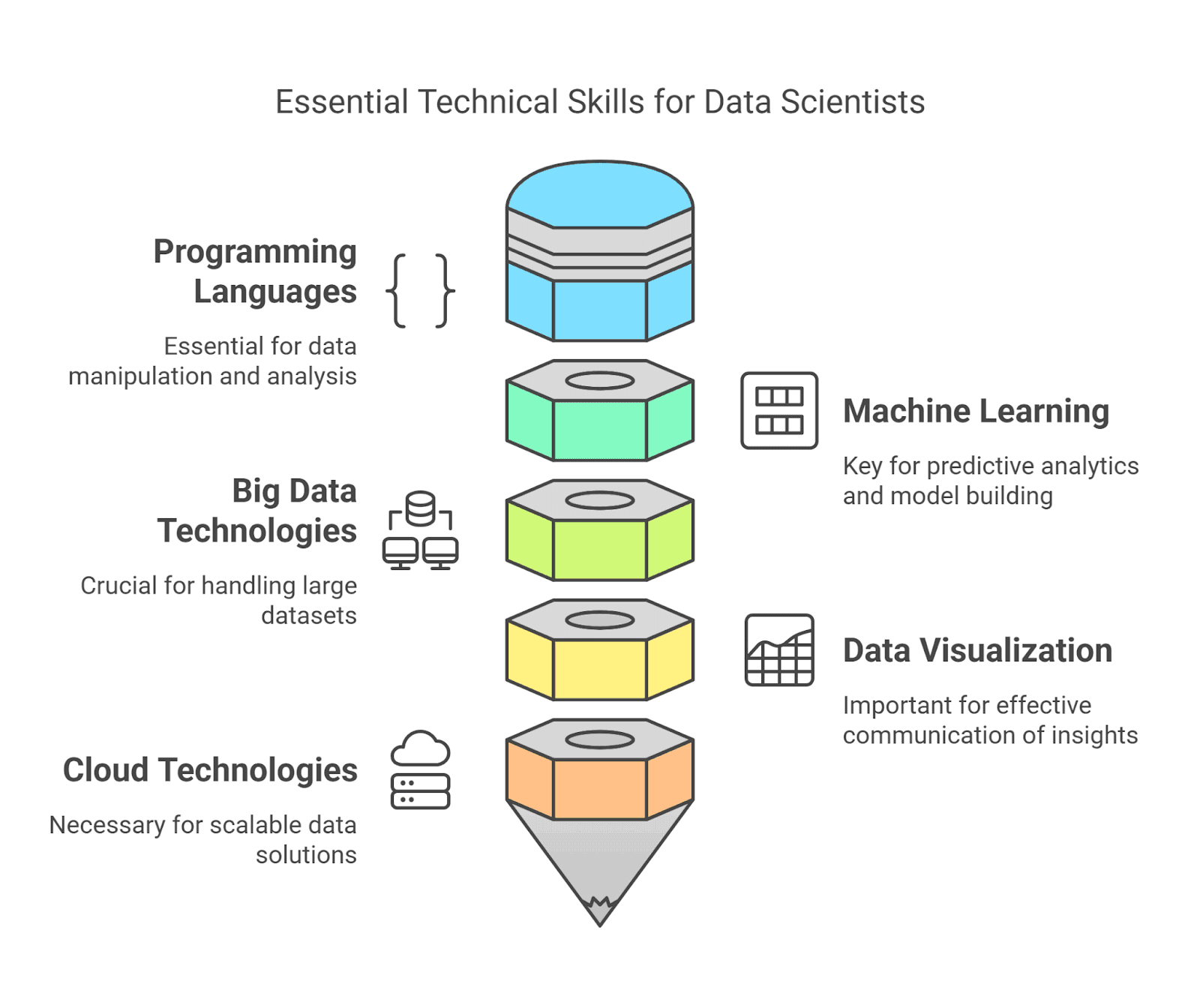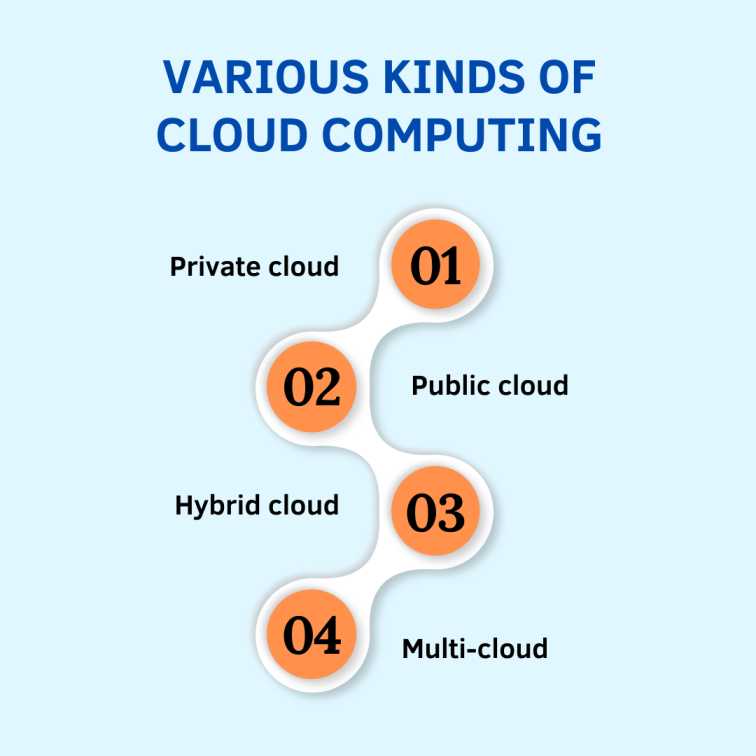The demand for data scientists is on the rise as businesses across industries recognise the power of data-driven decisions. However, with the rise in the field comes competition. To be competitive and witness consistent career progress in data science, professionals have to be very skilled technically, have a high-quality portfolio, and engage with industry networks to get access to more opportunities.
This blog post provides in-depth career guidance in data science, data science career market analysis, data science career advice and actionable guidance to help you navigate through data science career prospects.
Whether you are a fresh professional looking for direction or an industry professional who wishes to be a leader, this blog will help you navigate the realm of data science professional growth effectively.
Getting Acquainted with the Data Science Landscape
Why is Data Science the Future of Business?
Data science is not a technical field—it’s right now a business necessity. Organisations are literally leveraging data to power operations, enhance customer experience, and make informed decisions.
A report by McKinsey & Company cites that organisations which invest in data science and AI-based decision-making enhance overall productivity by 20-30% (source).
From predictive health analytics to detecting financial fraud, data science job opportunities are available and growing in all sectors. The role is evolving, and hence data scientists are taking on more strategic roles.
Trends in the Data Science Employment Market
The data science employment market trends indicate high demand and shifting expectations:
- AI and Automation Surge – AI-driven automation is transforming data analysis, and machine learning proficiency is a sought-after asset.
- Cloud Computing Integration – As businesses are shifting towards cloud platforms, awareness of AWS, Google Cloud, and Azure is in high demand.
- Ethical AI and Data Privacy – As businesses are focusing more on ethical AI and regulation, the demand for data professionals with awareness of AI ethics and governance is increasing.
According to Glassdoor, data science remains among the best-paying fields, and the global average salary equaled $120,000 annually (source).
Key Skills for Career Advancement in Data Science
Technical Skills Every Data Scientist Needs to Master
To progress with data science professional development and to grab career career opportunities in data science, skills like the following are required:
- Programming Languages – R and Python dominate, with SQL being essential for data manipulation.
- Machine Learning & Deep Learning – It is essential to master supervised, unsupervised, and reinforcement learning models.
- Big Data Technologies – Hadoop, Spark, and Apache Kafka are popularly used to manage large-scale data.
- Data Visualisation & Storytelling – Tableau, Power BI, and Matplotlib help in making data insights more digestible.
- Cloud & DevOps Skills – Familiarity with Docker, Kubernetes, and CI/CD pipelines makes a data scientist more versatile.

To be an expert in data science professional development, technical skills and soft skills have to be learned. The similarity of necessary skills required is given below:
| Technical Skills | Soft Skills |
| Python, R, SQL | Critical Thinking |
| Machine Learning & Deep Learning | Communication Skills |
| Big Data Tools (Hadoop, Spark) | Collaboration & Teamwork |
| Data Visualisation (Tableau, Power BI) | Problem-Solving |
| Cloud Computing (AWS, Azure, Google Cloud) | Business Acumen |
Learn these skills through Imarticus Learning Postgraduate Program in Data Science and Analytics.
Soft Skills That Set You Apart
Technical skills matter, but it is soft skills that really contribute to career progression in data science:
- Critical Thinking – Ability to comprehend complex data patterns and infer conclusions.
- Communication Skills – Presenting findings to non-technical stakeholders is a winner.
- Collaboration & Leadership – Cross-functional collaboration with business teams and data engineers maximizes impact.
Career Development Strategies in Data Science
1. Continuous Learning: Stay Current with Industry Trends
The tech industry evolves rapidly, and the same applies to data science. Data science career growth requires ongoing learning in the form of online courses, certifications, and workshops.
Recommended Learning Resources
- Postgraduate Programme in Data Science & Analytics – Imarticus Learning – Industry-specific programme with experiential learning.
- MIT’s Applied Data Science Program – A career-oriented programme for working professionals who wish to change their careers.
2. Gain Hands-On Experience Through Real Projects
Employers seek real-world experience, so having a strong portfolio is key.
How to Create Your Portfolio:
- Work on open-source projects at GitHub.
- Join data science competition sites such as Kaggle.
- Work on solo projects using real-world datasets from places like Google Dataset Search.
3. Network & Make Industry Connections
Networking is the underrated but powerful career-building tool. 85% of jobs are acquired through networking (source).
Where to Network:
- Network at NeurIPS, Strata Data Conference, or similar industry conferences.
- Network through LinkedIn groups like Data Science Central.
- Engage in online communities like Towards Data Science on Medium.
4. Specialise in High-Demand Areas
In a world with growing competition, specialist areas can help you gain an upper hand over others. Some of the latest popular specialisations include:
- Natural Language Processing (NLP) – Utilised in chatbots, search engines, and language translation.
- Reinforcement Learning – Applied in AI-driven robotics and automated trading platforms.
- Data Science for Finance – Financial modeling, fraud detection, and risk evaluation.
Upskilling Your Data Science Career: Challenges
Keeping Up with New Technologies
Given the rapid advances in AI and machine learning, one must continue to learn to stay current.
Solution:
- Subscribe to blogs like Towards Data Science.
- Watch YouTube channels like Data School for quick tutorials.
Bypassing Saturation in the Job Market
With more professionals joining the field, there is a need to distinguish oneself with unique skill sets.
Solution:
- Build area expertise in healthcare, fintech, or cybersecurity analytics.
- Learn advanced topics in quantum computing and edge AI.
FAQs
Which programming languages are best suited for data science?
Python, R, and SQL are most favored.
Do I need to possess a PhD to be a data scientist?
No, but practice and certification do matter.
Which sectors pay the highest for data scientists?
The finance, AI-based companies, and cloud technology firms pay the best.
How can I enter into AI-specialised work?
Master deep learning, GANs, and reinforcement learning.
How much time is required to learn data science?
It would take 6 months to 2 years with formal study.
What is the career growth in data science?
It’s probable to grow with AI, quantum computing, and blockchain backing.
Is freelance a suitable option for data scientists?
Yes, most professionals offer services via platforms like Upwork and Fiverr.
How can I start data science when I am new to it?
Learn online courses, build small projects, and join open-source repositories.
What’s the best option to build a strong resume for data science?
Emphasise projects, certifications, and real-world applications.
How do I land my first data science job?
Build a portfolio, connect with industry professionals, and pursue internships.
Conclusion
The key to a successful data science career is continuous learning, learning through experience, and networking. The job market trends for data science reveal high demand but intense competition, hence specialisation and industry participation are necessary.
Key Takeaways
- Keep learning – Cloud computing, machine learning, and AI are developing very fast.
- Develop hands-on experience – Projects and certifications enhance employability.
- Network strategically – Join industry events, get connected with professionals, and engage in open-source communities.
Ready to Level Up Your Data Science Career?
Join the Postgraduate Program in Data Science & Analytics by Imarticus Learning. Get hands-on training, industry-approved certifications, and mentorship from experts to boost your career!











